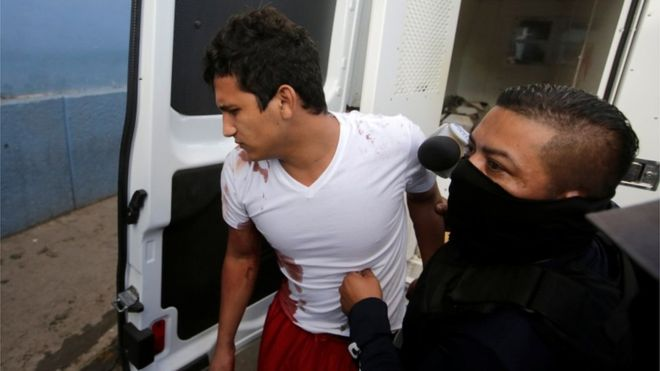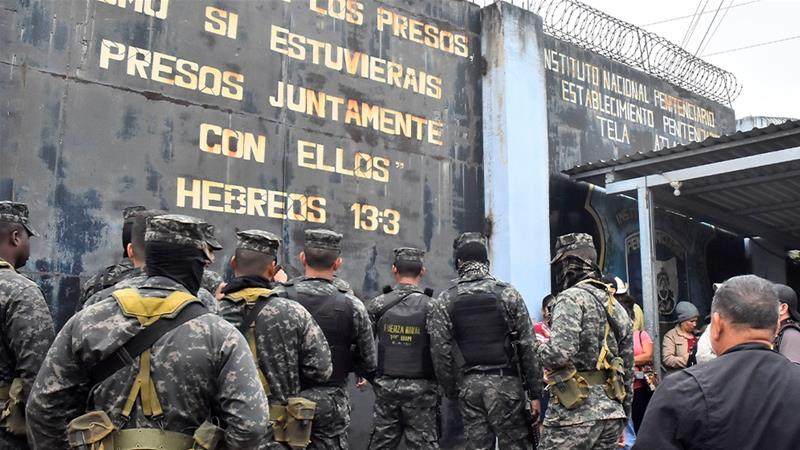Prisoners fought with each other in the prisons of Honduras that has killed 18 prisoners and have injured more than 100 of prisoners in different prisons of Honduras. Prison quarrel and fights between inmates turned into a serious fight and staggering gang violence taking lives of 18 prisoners in Honduras prisons.

The deaths on Sunday took place in Honduras’s El Porvenir penitentiary, which is about 70 kilometres (43 miles) east of the capital Tegucigalpa, and followed a fight between gangs at a prison in the northern port city of Tela in which at least 16 are declared dead by the prison authorities.
Overcrowded situations of Honduras prisons is blame worthy for these adverse consequences, that cause unrests and fatal accidents very frequently in the prison system of Honduras.

According to Lieutenant Antonio Coello, a security spokesman, dead and injured were said to be attacked with bullets and sharp weapons, while talking to our reporter. Since October, there have been at least five shootouts in Honduran prisons. People are asking the authorities that how the weapons were smuggled in the prison facilities. Newspapers and social media is blaming the authorities for having links with the gangs and helping them in the prisons for getting telephones, drugs and weapons and getting bribes from these prisoners and their gangs.
On Saturday, top military officer General Tito Livio Moreno indicated that the military would be deployed to 18 jails identified as “high risk” jails and prisons. On social media people are asking that how will it work, while the prisons and officers and gangs have ties with each others at very high levels.

In the wake of these incidents Honduran President Juan Orlando Hernandez, released an order for the army and the police on Tuesday to take full control of the country’s 27 prisons, which are badly overcrowded with some 21,000 inmates that is more than double of the population that is allowed to host in the prisons.
Complications due to overcrowding have been exacerbated by the deplorable conditions found inside Honduran prisons, which tend to promote criminality rather than rehabilitating the inmates. There are no precautions taken by the prison officers for sexual assaults on other prisoners, beating of new inmates coming in the prison systems, bullying of gang members against the other prisoners and the influence of drug lords inside the prisons.
A 2012 investigation undertaken by the Associated Press (AP) in which journalists toured a San Pedro prison found that it was “essentially an autonomous town complete with women, children, businesses and a marketplace.” According to the sources and confidential official of the prison system speaking on the conditions of anonymity said that you can get anything and everything in the prisons as long as the prisoner is able to bribe the prison officers, he further said that you can not only get drugs, weapons, telephones, but you can also get seperate room and spend a night with a hooker or prostitute.
The Inter-American Commission on Human Rights (IAHCR) has referred to these prisons as “dehumanized, miserly, and corrupt” and “completely contrary to human dignity” arguing that these problems have occurred due to the structural deficiencies present in Honduran correctional facilities which have allowed inmates to gain autonomy over prison institutions.
Indeed, the Honduran prison system has repeatedly failed to live up to international human rights standards. According to a 2014 report by the Comisionado de los Derechos Humanos de Honduras (CONADEH), Honduras’ penitentiary system is plagued by poor nutrition, lack of professional and medical attention, and the presence of drugs, alcohol, weapons, and violence.
Government officials acknowledge that allowing prisoners to take charge of the prisons is a major factor in terms of corruption. Funds collected by the leaders of the prisoners at SPS, for example, are shared with the prison administration, which claims to use the money to pay for prisoner’s upkeep. Costs range from $50 for the worst cells to $750 for a clean, safer cell. One prisoner pays $25 a week for permission to run a restaurant. When our media reporter asked for these types funds funnelled to the officials then; according to prison officials, the money is necessary to operate the underfunded prison.
The prison system of Honduras is in dire need of reform. The very aim of a prison, that is to rehabilitate and to secure the interests of prisoners, who are detained is in danger. There is a need to alter the whole system, gang ruling needs to taken into account for the improvements. The entry of drugs with such “high security” is also an issue of major concern. The need now is for long term healing and not just band-aided short term solutions of these deaths. Without judicial reforms addressing these issues, it is unlikely Honduras’ prison system will experience a long-term reduction in overcrowding.
According to one of the elected official of Canada Mr. Jasvir Singh Deol said that these types of deaths are not acceptable and conveyed his condolences to the victim families.

